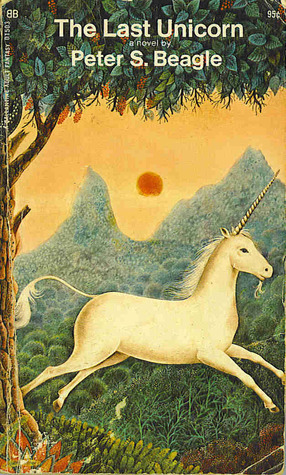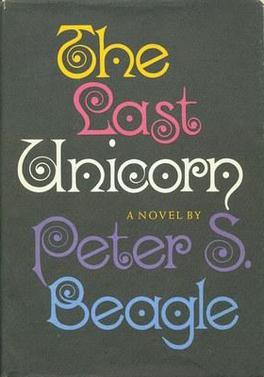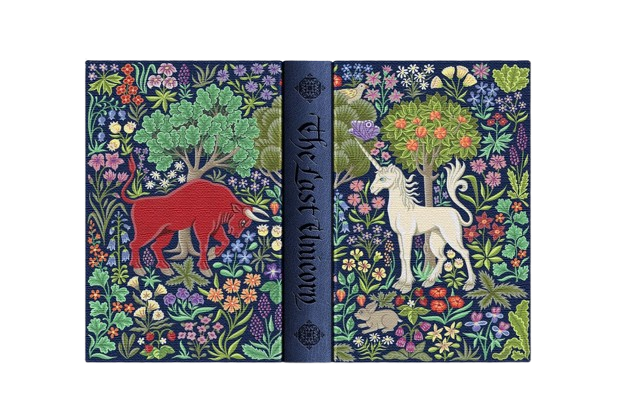Welcome to Lost in a Lilac Wood, a small fanshrine dedicated to my favorite novel, The Last Unicorn by Peter S. Beagle. Let yourself be enveloped into this webpage's eternal summer evening, tucked away in a flowering grove. ![]()
Lost in a Lilac Wood will not be as extensive as Princess Guard, my fanshrine dedicated to Aerith or even the Mad Tea Party. Real talk? I wanted a pretty place that evokes the book's atmosphere, one where I can curate a collection of thoughts my feelings and share anything I find interesting!
While this shrine does touch on the movie (and incorporates its artwork into the design), it is primarily dedicated to the book. As a warning, there will be unmarked spoilers.

About The Last Unicorn
In a lilac wood where the leaves are always green, there lives a unicorn and she lives all alone. She's happy to be alone, too, amused by the animals who call her forest home. Time has no meaning to the unicorn, for she is immortal. Because of this, her existence is untroubled; what can trouble a creature who has never been touched by death? Things change, however, when she overhears two passing hunters, who claim that there's no more unicorns in the world. Disturbed that she may be the last of her kind, the unicorn leaves the comfort of her magical wood to investigate further.
Outside her eden's shelter, the unicorn encounters the capabilities of human actions, from their cruelty to their kindness. She finds companions in Schmendrick, a magician who struggles in casting magic, and Molly Grue, a wife's bandit who never stopped believing in unicorns. She also finds enemies in the Red Bull, a being under the thumb of King Haggard and is responsible for the unicorns' disappearance. When the Red Bull targets her, Schmendrick turns the unicorn into a human––a fate which she finds worse than death.
There's a cold comfort to her transformation. The unicorn, now going by Lady Amalthea, takes residence in King Haggard and his son Prince Lir's castle to learn more the unicorns' disappearance. But the trouble is that the longer Amalthea stays human, the more she forgets about being a unicorn.
Still aloof even as a human, Lady Amalthea cannot stay detached to the messiness of human emotions. Through her transformation, Amalthea learns what it means to love and live. At the novel's conclusion, after she frees her fellow unicorns from the sea and is changed back to her true form, she learns one of the most important lesson of humanity, a lesson only available to mortals who are someday destined to die: what it means to regret.

Analysis
While it may not be a perfect book, The Last Unicorn is perfect to me and for me. It entered my life at the right time, when grief was transforming me inside out. It just being serious, somber, and oh-so silly. Peter S Beagle's prose paints pictures in your mind, his word choice so precise and powerful. But what resonates with me the most is its themes. Below are mini essays about whatever I feel like writing about!
The Last Unicorn is about many things; in just over 300 pages, it touches on fairytale conventions, the numinous, innocence and the loss of it, and so much more. What resonates with me the mostt though is its analysis of mortality and immortality. The Last Unicorn finds beauty in all that's fleeting. In all that dies.
Nothing lasts, so it's special.
While some may argue the opposite, death gives our existence meaning. We're all the more precious for how ephemeral we are in the grand scheme of things. At one point, Schmendrick tells the unicorn that all that dies is "beautiful... ...who is the most beautiful creature in the world." Wherein lies the beauty the exactly? In a limited lifespan. Mortals can't afford to languish within our own lives because our time is finite. How precious it is to have any time at all. Someday, each of us will be be gone from Earth––at least in a physical sense. An unnerving prospect for many, but having awareness of this encourages meaning making. To make every moment count. To open ourselves to a vast range of emotions and experiences that simply isn't available to the unicorn at the start of the novel.
Regret is a foreign concept to the unicorn, to the extent that she declares no unicorn has never known it. And how could she? Immortality gives you the luxury of not having to. Time is infinite. Not worrying about this is yet another hallmark of the unicorn's innocence. Yet, by the novel's conclusion, after she becomes human, she is no stranger to regret. What's more, the unicorn actually thanks Schemendrick for letting her know it. This is a distinct contrast from her initial scorn over her transformation, where she wished that the Red Bull could have killed her instead. But it's by feeling this regret does the unicorn know the extent of how much she had loved and been loved in return. Which is to say an extent she never would have known otherwise. Regret is more complicated than feeling sad over a missed opportunity or wishing you had acted differently at another point. Rather, it's a deep longing over lost time, a deep wish for more of it, trying to take back what can never be yours again.
Time is the most valuable substance in the universe. Despite what the ultra wealthy are attempting to do now (bizarre endeavors to live forever), no amount of money can ever buy you more. Unless you're already immortal. As stated earlier, time has a different meaning for the immortal. If you are, the sand will never run out of your hourglass because you were never given one at all, and are left existing in a limbo.
But to mourn lost time? To regret? It's another way to say that you have loved. And because the innocence perpetuated by the unicorn's immortality, she had never known what it truly means to love someone or something with the force of knowing that someday it will no longer be of this Earth. After Prince Lír dies attempting to protect from the Red Bull, the unicorn understands this at once––understands grief and loss and love. And it's through her grief she's able to defeat the Red Bull and free the other unicorns from his control once and for all. Grief can sink us into the deepest depths of the ocean, but if we allow it, it can also grant us the power to move mountains.
There's several ironies to this. What saves the unicorns is her experiences with humanity, and its her newfound humanity that will never allow to be at "home" with the rest of them. One part of the unicorn will always be the Lady Amalthea, a woman who had felt her body die all around and who had loved and lost. And the fact she couldn't even make her own choices regarding the transformations is an added layer of tragedy. But don't we all lack agency with who and what death touches, and at what time?
In Geoffrey Reiter's article "'Two Sides of the Same Magic': The Dialect of Mortality and Immortality in Peter S. Beagle's The Last Unicorn," Reiter argues that The Last Unicorn does not privilege mortality and immortality, rather it portrays a dichotomous relationship between the two. He states that the unicorn represents an ideal for the characters in the story, serving as something for them to strive towards. To an extent this is true. Mortals can achieve immortality through their legacy. You open up a book, and the story and setting and characters come alive again, no matter old they are. Their present is your present. However, I would argue that The Last Unicorn presents the dangers of taking this too literally and sacrificing the present's now.
King Haggard, Mama Fortuna, and Cully feel miserable about several aspects about their lives, and because of their lives. They attempt to evade their mortality through a variety of means, going on to inflict harm upon others. Ironically enough, accepting your own mortality gives you the key to unlocking a spiritual, transcendent immortality by living your life to the fullest and creating that aforementioned immortality. While we cannot (and should not) deny our humanity, by fully embracing it we can rise beyond it and see things for how they are.
Immortality and Mortality (working title lmao)

Upcoming essay I eventually want to write about the presence of the Japanese concept of mono no aware in the novel.
Mono no Aware in The Last Unicorn

Quotes
A sample of my favorite quotes and passages from the novel.

“It’s a rare man who is taken for what he truly is.”
Molly laughed with her lips flat. "And what good is it to me that you're here now? Where where you twenty years ago, ten years ago? How dare you, how dare you come to me now, when I am this?" With a flap of her hand she summed herself up: barren face, desert eyes, and yellowing heart. "I wish you had never come. Why did you come now?" The tears began to slide down the sides of her nose.

Book Covers
Some of my favorite covers used for The Last Unicorn. Enjoy perusing!

Links
"Two Sides of the Same Magic": The Dialect of Mortality and Immortality in Peter S. Beagle's The Last Unicorn by Geoffrey Reiter ❀ As mentioned in my mini essay, I don't agree with all his arguments, but I wanna highlight the point he makes about the unicorn becoming something entirely new by the end of the book.



